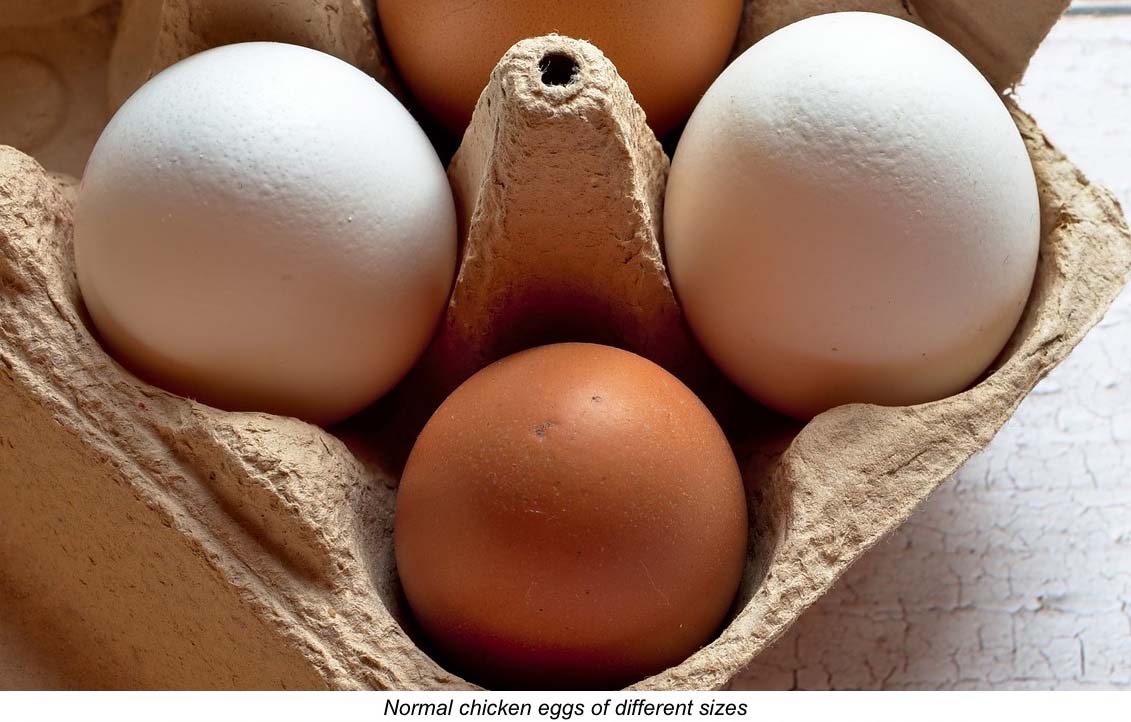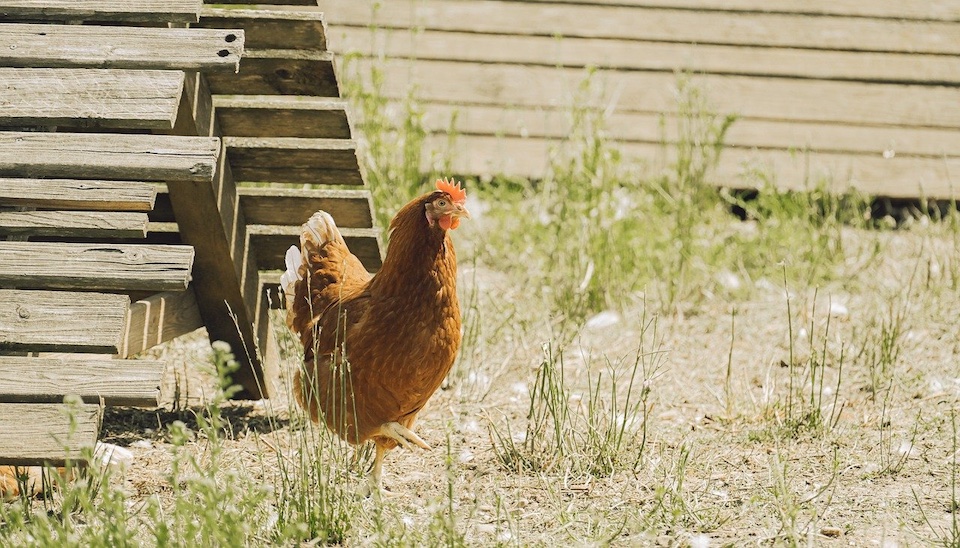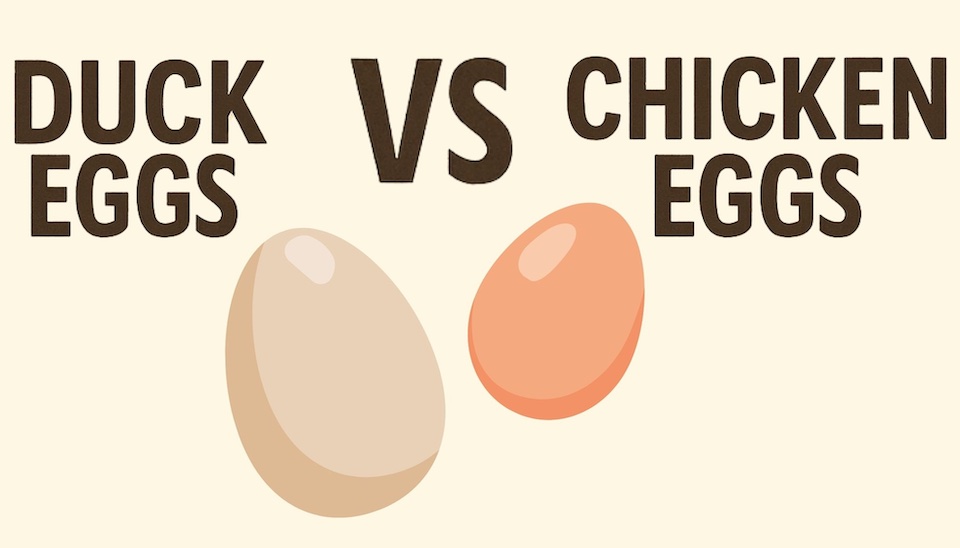How to get bigger eggs from your chickens – egg weight and size
Egg weight
The size of a chicken egg is measured by weight. That's why a carton of eggs from the supermarket has a minimum weight.
In Australia, a Medium egg weighs 43 g on average and a Large egg weighs 52 g. But Australian egg sizes are slightly smaller than the USA or UK, where our Large egg would likely be labelled Medium.
For this reason, it can pay to measure eggs by weight when baking with a recipe from overseas. For a complete egg weight conversion chart, scroll to the end of this article.
What is the average weight of a chicken egg?
The average weight of a chicken egg is 50-70 g. However, this is based on commercial laying hens.
There are a lot of factors which influence egg weight and so the average egg for a backyard chicken can vary significantly.

What influences chicken egg weight?
Chicken egg weight is influenced by a range of factors.
Breed
Different chicken breeds lay different-sized eggs. Obviously, the egg of a bantam is much smaller than that of a Rhode Island Red.
But the size of a chicken breed doesn’t necessarily mean it will lay small eggs. Even similar sized breeds can lay different sized eggs and vice versa. For example, our leghorns are much smaller than our ISA Browns but on average they lay a similar size egg.
Also, different genetic lines of a breed can produce different sized eggs. For example, leghorns from a commercial hatchery lay large eggs for their size (but still smaller than most large breeds) whereas heritage breeder lines may lay smaller eggs.
For bigger eggs:
- Choose larger breeds known for producing larger eggs. Large-bodied heritage breeds are known for laying large eggs. Choose Welsummers, Rhode Island Reds, Plymouth Rocks, Sussex, Orpingtons, Barnvelders, Marans and Wyandotes.
- Research the egg characteristics of different genetic lines of the chicken breeds you plan to buy
- Ask breeders about egg size
Genetics
The characteristics of a chicken breed are the result of the choices breeders make over time. If a breeder is not selecting for large eggs, then their flock will not produce particularly large eggs.
Today, few breeders select for egg size. Commercial breeds usually preference uniform egg quality and the ability to endure commercial conditions. Heritage breeders are often looking for breed characteristics related to appearance. Backyard breeders may select for mothering ability or egg production.
In addition to genetic traits, some chickens just naturally lay smaller eggs even when they come from large-egg breeds. That’s genetics and, except avoiding breeding from them, there is nothing you can do.
For bigger eggs:
- Breed from birds that naturally lay larger eggs than others of their breed and age
- Ask breeders about egg size and whether they are selecting for it
Age
Eggs become progressively bigger and heavier as chickens age.
Chickens begin laying around 20 weeks of age and produce smaller eggs, usually weighing less than 53 g, for the first 5-10 weeks of laying.
After 30 weeks, most hens produce eggs in the range of 53-73 g. For average laying hens, a 60 g egg is produced by around 26 weeks and egg size will continue to increase at a rate of 0.1 g per week thereafter.
For modern hybrid layers such as ISA Browns, a 65 g egg is average after 50 weeks of age.
Of course, egg size doesn’t increase indefinitely. After 2-3 years of laying, or perhaps more for long-lived heritage chicken breeds, egg production will decrease but chickens will continue to lay relatively large eggs until near the end of their laying life.
For bigger eggs:
- Keep your chickens until they are 2-3 years of age
- Choose long-lived heritage breeds
Diet
Dietary deficiencies definitely impact egg production and egg weight. In particular, protein, calcium and amino acids are key to egg production. Deficiencies will decrease egg weight and lower overall production.
In particular, methionine and linoleic acid in feed increase egg weight.
For bigger eggs:
- Give your chickens free access to a complete, premium layers feed with a minimum of 16% protein
- Don't give your birds too many scraps or treats that will decrease feed consumption
- Choose a mash or pellet feed to avoid deficiencies caused by selective eating
- Ensure sufficient calcium intake
- Supplement the diet with methionine and linoleic acid, for example with Dried Mealworms
Pullet weight
Studies have shown that the weight of a chicken when it first begins laying will affect egg weight for the hen’s entire laying life. Pullets that are small and/or begin laying early will always lay smaller eggs.
You can't control when pullets begin laying, but you can influence it. You can also ensure your pullets attain good weight gain, which will lead to bigger eggs when your pullets begin laying:
- Provide free access to a premium, age-appropriate feed (Chick Starter/Grower Feed)
- Manage coccidiosis and other parasites
- If possible, time your hatch so pullets will be full-grown before spring as the onset of laying is often triggered by lengthening days and increasing temperatures, although this is less prominent in many Australian climates
Stress and disease
Any sort of stress, from environmental changes and disease, to feather-pecking and predation, can cause hens to lay fairy eggs (fart eggs) or to produce eggs that are smaller than normal.
For bigger eggs:
- Manage environmental stressors
- Practice good biosecurity
- Monitor and treat for parasites regularly
- If egg size is smaller than average for age and breed, check your birds for disease
Are bigger eggs better?
Bigger eggs aren’t necessarily better. For many chicken keepers, consistent egg production is more important than the size of the eggs. Larger eggs also have weaker shells, which can lead to more lost eggs due to cracking and breakage.
Egg shell quality
Large eggs naturally have weaker shells. If you have hens that lay large eggs, either because of age or breed, supplementing with calcium can improve egg shell integrity.
Weak egg shells can be improved with a Calcium supplement.
Free-choice minerals for calcium include:
- Nutri-grit
- Oyster shell
- Limestone
- Ground-up egg shells
At a minimum, shell-grit should be available at all times. Other mineral options are recommended where chickens are producing weak egg shells, for example large eggs, but are not a replacement for a supplement. These minerals should always be provided separately from feed and never force-fed.
Egg weight and cooking
Although some cooks favour larger eggs, the nutritional and other qualities of large and small eggs are very similar.
Smaller eggs tend to have a higher proportion of yolk to white, so can be better for baking. Large eggs often have proportionally more white, which is useful when making meringues and macarons.
When baking, it is best to measure eggs by weight or volume rather than number. This is because egg size can be so variable. For example, a UK recipe calling for a Medium egg would require a Large egg by Australian supermarket standards.

Many cooks measure eggs by weight or volume rather than egg number, especially when baking. This is a particularly good idea when using eggs from your own chickens, as size can be more variable and difficult to judge.
Egg weight conversions for baking - Australia, USA & UK
If measuring eggs by weight, you can use the following table to convert egg size into grams based on the country of origin of your recipe.
| Australia | The USA | The UK | |
| Peewee | 35.4 g | ||
| Small | 42.5 g | < 53 g | |
| Medium | 43 g | 49.6 g | 53-63 g |
| Large | 52 g | 56.7 g | 63-73 g |
| Extra Large | 60 g | 63.8 g | > 73 g |
| Jumbo | 68 g | 70.9 g | |
| King Size | 73 g |
Would you like to learn more about egg production?
You might like these blog articles:
- What causes fart eggs (fairy eggs)?
- How to improve egg production in older hens
- Egg-binding: Symptoms and Treatment
Happy chicken keeping!
Rachael at Dine a Chook Australia



